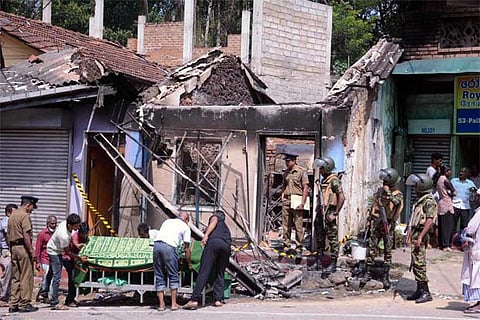

Colombo
Sri Lankan authorities on Monday discovered a facility believed to be used as a training centre by the suicide bombers prior to the terror attacks on churches and luxury hotels on the Easter Sunday that killed more than 250 people.
Nine suicide bombers carried out a series of devastating blasts that tore through three churches and three luxury hotels on the Easter Sunday. The Islamic State claimed the attacks, but the government blamed local Islamist extremist group National Thawheed Jammath (NTJ) for the attacks.
The two-storey building was discovered in the Blackpool area in Nuwara Eliya. Details of this facility had surfaced during questioning of some suspects who were arrested in connection with the NTJ in Sainthamaruthu, Kalmunai, the Times Online reported.
"It is believed that 38 members of the NTJ group including suicide bomber Zahran had received training at this facility prior to the recent terror attacks," it said.
According to the preliminary investigations, the final training session which was attended by Zahran took place on April 17 - four days prior to the deadly Easter attacks.
Zahran, the mastermind behind the Easter blasts, led the attack on the Shangri-La hotel and was accompanied by a second bomber identified as Ilham Ahmed Ibrahim. He was killed inside the hotel where he blew himself up.
The training centre had been set-up in the building that had been on rent.
Police have arrested the owner of the house and two other individuals who had allegedly provided accommodation facilities at the building.
The NTJ has no history of large-scale attacks. The group came to prominence last year when it was blamed for damaging Buddhist statues.
All suicide bombers involved in the blasts are believed to be Sri Lankan nationals.
In a statement issued through its propaganda 'Amaq' news agency two days after the attacks, the ISIS identified the attackers as Abu Ubayda, Abu al-Mukhtar, Abu Khalil, Abu Hamza, Abu al-Bara'a, Abu Muhammad and Abu Abdullah.
President Maithripala Sirisena last week used emergency powers to ban the NTJ and a splinter group identified as Jamathei Millathu Ibraheem (JMI).
The move to ban the outfits came after the Lankan Parliament adopted a newly-enforced emergency regulation on Wednesday following a series of eight coordinated blasts, which ripped through three churches and three high-end hotels frequented by tourists on April 19 in the country's deadliest violence since the devastating civil war ended in 2009.
Visit news.dtnext.in to explore our interactive epaper!
Download the DT Next app for more exciting features!
Click here for iOS
Click here for Android